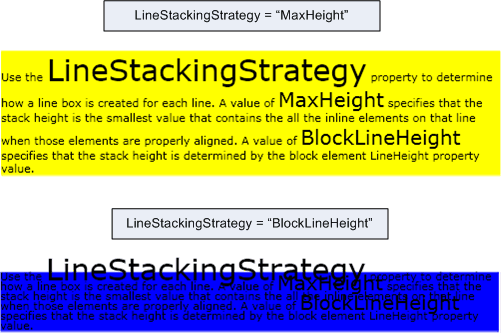Block.LineStackingStrategy Propiedad
Definición
Importante
Parte de la información hace referencia a la versión preliminar del producto, que puede haberse modificado sustancialmente antes de lanzar la versión definitiva. Microsoft no otorga ninguna garantía, explícita o implícita, con respecto a la información proporcionada aquí.
Obtiene o establece cómo se determina un cuadro de línea por cada línea de texto dentro del elemento de contenido del flujo de nivel de bloque.
public:
property System::Windows::LineStackingStrategy LineStackingStrategy { System::Windows::LineStackingStrategy get(); void set(System::Windows::LineStackingStrategy value); };public System.Windows.LineStackingStrategy LineStackingStrategy { get; set; }member this.LineStackingStrategy : System.Windows.LineStackingStrategy with get, setPublic Property LineStackingStrategy As LineStackingStrategyValor de propiedad
Uno de los valores LineStackingStrategy que especifica cómo se determina un cuadro de línea por cada línea de texto dentro del elemento de contenido del flujo de nivel de bloque. El valor predeterminado es MaxHeight.
Ejemplos
En el ejemplo siguiente se muestra cómo usar la LineStackingStrategy propiedad para determinar cómo se crean los cuadros de línea para las líneas de texto de .TextBlock El primero TextBlock tiene un LineStackingStrategy valor de MaxHeight y el segundo TextBlock tiene un valor de BlockLineHeight.
<Page xmlns="http://schemas.microsoft.com/winfx/2006/xaml/presentation"
xmlns:x="http://schemas.microsoft.com/winfx/2006/xaml">
<StackPanel>
<!-- This TextBlock has a LineStackingStrategy set to "MaxHeight". -->
<TextBlock LineStackingStrategy="MaxHeight" LineHeight="10" Width="500" TextWrapping="Wrap"
Background="Yellow">
Use the <Span FontSize="30">LineStackingStrategy</Span> property to determine how a line box is
created for each line. A value of <Span FontSize="20">MaxHeight</Span> specifies that the stack
height is the smallest value that contains all the inline elements on that line when those
elements are properly aligned. A value of <Span FontSize="20">BlockLineHeight</Span> specifies
that the stack height is determined by the block element LineHeight property value.
</TextBlock>
<!-- Here is the same TextBlock but the LineStackingStrategy is set to "BlockLineHeight". -->
<TextBlock LineStackingStrategy="BlockLineHeight" LineHeight="10" Width="500" TextWrapping="Wrap"
Background="Blue" Margin="0,40,0,0">
Use the <Span FontSize="30">LineStackingStrategy</Span> property to determine how a line box is
created for each line. A value of <Span FontSize="20">MaxHeight</Span> specifies that the stack
height is the smallest value that contains all the inline elements on that line when those
elements are properly aligned. A value of <Span FontSize="20">BlockLineHeight</Span> specifies
that the stack height is determined by the block element LineHeight property value.
</TextBlock>
</StackPanel>
</Page>
En la ilustración siguiente se muestra el resultado del código anterior.

Comentarios
Esta propiedad de dependencia también tiene un uso de propiedad adjunta. En XAML, el uso es <object Block.LineStackingStrategy="value".../>, donde object es un elemento object (normalmente un elemento flow) contenido en una Block clase derivada, y value es un valor de cadena de la LineStackingStrategy enumeración. En el código, el uso de la propiedad adjunta es compatible con los GetLineStackingStrategy métodos y SetLineStackingStrategy . El uso de la propiedad adjunta no es común.
Información sobre propiedades de dependencia
| Campo identificador | LineStackingStrategyProperty |
Propiedades de metadatos establecidas en true |
AffectsMeasure, AffectsRender |